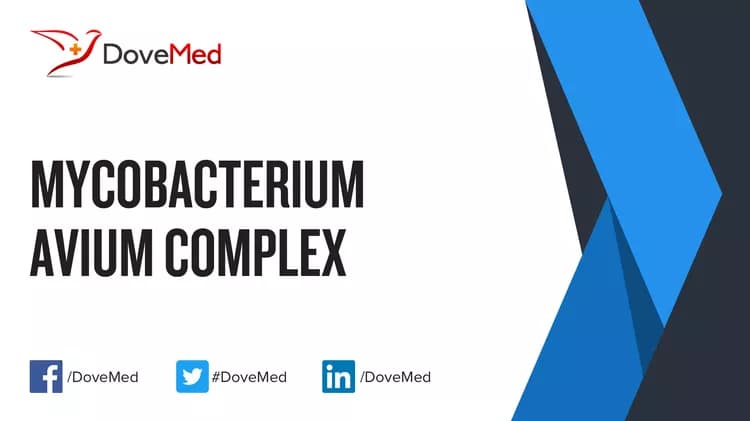What are the other Names for this Condition? (Also known as/Synonyms)
- MAC (Mycobacterium Avium Complex)
- MAI (Mycobacterium Avium-Intracellulare Infection)
- Mycobacterium Avium-Intracellulare Infection (MAI)
What is Mycobacterium Avium Complex? (Definition/Background Information)
- Mycobacterium Avium Complex (MAC) refers to infections caused by two types of bacteria: Mycobacterium avium and Mycobacterium intracellulare
- MAC primarily affects people with compromised immune systems (for example from AIDS, hairy cell leukemia, or immunosuppressive chemotherapy) or underlying lung disease
- Symptoms can be non-specific and may include fever, sweats, weight loss, abdominal pain, fatigue, chronic diarrhea, and anemia
- Mycobacterium Avium Complex may cause local disease affecting the central nervous system, lymph nodes, soft tissue, or bones; or, it may cause multi-system disease also affecting other organs and systems
- Mycobacterium Avium Complex is spread when the bacteria, found in water, soil and dust particles, are inhaled or ingested
- The treatment for Mycobacterium Avium Complex varies depending on the type and may include antibiotics, anti-tuberculosis drugs, and/or surgery
(Source: Mycobacterium Avium Complex; Genetic and Rare Diseases Information Center (GARD) of National Center for Advancing Translational Sciences (NCATS), USA.)
Who gets Mycobacterium Avium Complex? (Age and Sex Distribution)
- Mycobacterium Avium Complex is a rare infectious disorder. The presentation of symptoms may occur at any age
- The condition most often affects males and females with weak immune systems
- Worldwide, individuals of all racial and ethnic groups may be affected
What are the Risk Factors for Mycobacterium Avium Complex? (Predisposing Factors)
The risk factors for Mycobacterium Avium Complex may include:
- Being infected with HIV infection or AIDS
- Having compromised immunity due to a variety of factors including:
- Auto-immune disorders
- Cancer treatments
- Immunosuppressant drugs used following organ or tissue transplantation
It is important to note that having a risk factor does not mean that one will get the condition. A risk factor increases one’s chances of getting a condition compared to an individual without the risk factors. Some risk factors are more important than others.
Also, not having a risk factor does not mean that an individual will not get the condition. It is always important to discuss the effect of risk factors with your healthcare provider.
What are the Causes of Mycobacterium Avium Complex? (Etiology)
- Mycobacterium Avium Complex is a bacterial infection caused by Mycobacterium avium and Mycobacterium intracellulare
- The bacteria are present in water, dust and soil, and gain entry into an individual through ingestion of inhalation
- Immune compromised individuals are more at risk being infected with the two bacterial species
What are the Signs and Symptoms of Mycobacterium Avium Complex?
The general signs and symptoms of Mycobacterium Avium Complex may include:
- Fever
- Sweating
- Weight loss
- Fatigue
- Diarrhea
- Shortness of breath
- Abdominal pain
- Anemia
Signs and symptoms of pulmonary Mycobacterium Avium Complex (develops gradually, with symptoms being present for weeks or months):
- Cough
- Fever
- Night sweats
- Fatigue
- Weight loss
Signs and symptoms associated with lymphadenitis due to Mycobacterium Avium Complex (more common in children 1-4 years old)
- Swollen lymph nodes
- Painful lymph nodes, in some few cases
Signs and symptoms of disseminated Mycobacterium Avium Complex (more common in individuals with HIV/AIDS)
- Abscesses in skin
- Infection of breast tissue (mastitis)
- Infection of skeletal muscle (pyomyositis)
- Lesions in brain
How is Mycobacterium Avium Complex Diagnosed?
Mycobacterium Avium Complex is diagnosed on the basis of the following information:
- Complete physical examination
- Thorough medical history evaluation
- Assessment of signs and symptoms
- Laboratory tests, such as blood, urine or stool test to check for presence of causative bacterial pathogens in systemic MAC
- Imaging studies
- Biopsy studies of sputum or phlegm in pulmonary MAC or lymph node for MAC lymohadenitis
Many clinical conditions may have similar signs and symptoms. Your healthcare provider may perform additional tests to rule out other clinical conditions to arrive at a definitive diagnosis.
What are the possible Complications of Mycobacterium Avium Complex?
The complications of Mycobacterium Avium Complex may include:
- Progression from acute to chronic infection
- Lung damage due to fibrosis
- Severe respiratory distress
- Compromised function of multiple organs in systemic infection
Complications may occur with or without treatment, and in some cases, due to treatment also.
How is Mycobacterium Avium Complex Treated?
The treatment for Mycobacterium Avium Complex may include:
- Administration of antibiotics
- Anti-tuberculosis medications
- Removal of excess mucus from lungs, using different techniques and devices, such as physical therapy of chest, nebulizer and chest wall oscillation
- Surgical treatment for affected lung or lymph node
How can Mycobacterium Avium Complex be Prevented?
Mycobacterium Avium Complex may be preventable (in some cases) by considering the following measures:
- Avoiding exposure to contaminated water, especially in pools and spas
- Seeking proper treatment for pre-existing diseases and conditions that may result in a compromised immune system
What is the Prognosis of Mycobacterium Avium Complex? (Outcomes/Resolutions)
- The prognosis of Mycobacterium Avium Complex is dependent upon the severity of the signs and symptoms and associated complications, as well as prompt diagnosis and treatment
- Children with Mycobacterium Avium Complex lymphadenitis may recover without treatment; this condition is often considered benign
- Without treatment, respiratory failure may occur in individuals with pulmonary MAC, leading to fatal outcomes
- In those with HIV/AIDS and pulmonary MAC, the treatment success rate is estimated to be about 20-90%, with an average success rate of 50-60%
- Individuals affected by MAC, with a BMI of less than 18.5 and anemia are known to have poorer outcomes
Additional and Relevant Useful Information for Mycobacterium Avium Complex:
The following DoveMed website link is a useful resource for additional information:
Related Articles
Test Your Knowledge
Asked by users
Related Centers
Related Specialties
Related Physicians
Related Procedures
Related Resources
Join DoveHubs
and connect with fellow professionals


0 Comments
Please log in to post a comment.